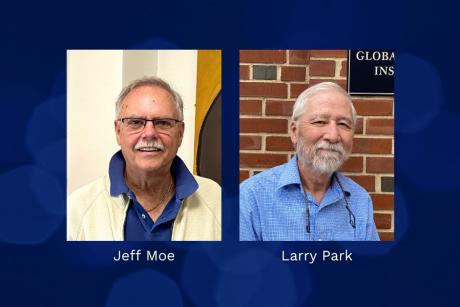
This sign welcomed us into Ghana, our home for the summer, where we are researching a distance-based degree program for nurse anesthetists.
Published June 26, 2015, last updated on October 17, 2017 under Voices of DGHI
By Ethan Levine
“What’re you doing this summer?”
“I’m going to Ghana for two months actually.”
“No way! That’s so cool!”
This was a typical version of a conversation I had many times throughout last semester. As soon as I told people that I was doing something abroad this summer, the excitement wasn’t so much about the project I would be doing, but rather that I was getting to go abroad to do it.
There are boundless opportunities in which a Duke student can partake in order to go abroad. It’s hard to walk across campus without seeing posters of the public policy internships abroad, the global health fieldwork opportunities, or even the various study abroad programs that Duke offers.
However, what’s sometimes lost in all this abroad excitement (specifically when it comes to service/research/work opportunities) is the actual purpose of these opportunities: doing meaningful work that will make a difference in these distant communities.
At times, it seems students are more concerned about the location they’re traveling to or simply the ability to travel somewhere instead of the work they will be doing. I cannot count all the times where I’ve heard someone describe his or her work/research/internship abroad experiences with details about how incredible the location was or how much fun he or she had being in that location, more so than the work he or she did.
And that’s not to say that the location doesn’t impact the experience. But personally, I think the work should be the focal point of one’s experience abroad, rather than simply the opportunity to travel. I know this is a touchy subject, because who am I to say what is meaningful and what isn’t, or what people’s motives are behind their actions. I just wanted to share my feelings on the issue of voluntourism as I have seen it and how it has impacted my thoughts going into my project.
This issue was weighing heavily on my mind as I boarded the first of many flights to Accra, Ghana. I knew that the work we were doing here would be significant: we are helping to lessen a global crisis of a lack of trained nurse anesthetists that is especially prevalent in lesser-developed countries (even here in Ghana, one of the most developed African countries).
We weren’t here to simply “be Americans” and assume we have a useful skillset that is necessary to help foreign people in a foreign culture. Instead we had spent many months developing our methods and tools and planning out how we were going to accomplish our goals.
This isn’t to say that much volunteer work abroad isn’t meaningful or beneficial to the communities in which they are located. It is just to point out that when doing this type of work, participants should not go in blind, and not simply expect that they have a useful skillset to help out.
We are here to survey students who have just completed their first year in a degree-based nurse anesthetist distance-learning education program for already-trained nurse anesthetists. We are also surveying their family members, their colleagues, their administrators, and other community members to try to truly assess how effective this program has been, for the student, the hospital, the family, and the community. We hope to use the results moving forward to improve upon this program and see how well distance education can work in the medical field.
Despite knowing what we would be doing here, I was still unsure if I was falling into the pit that I just criticized. “Couldn’t they have just paid someone here to do this instead?”, “Is our presence here going to make any difference?”, and other questions kept bouncing around my head right before we began our work.
But once we started, and I began both to hear various peoples’ stories and their excitement about us being there, these thoughts instantly went away. What we’re doing here isn’t only significant (or at least I strongly believe it to be so), but it’s also incredibly cool.
We saw two students who were in the upper-most part of Ghana, and thanks to this program they didn’t have to leave their already short-staffed hospitals to continue their education. We heard how the program has allowed the students to remain with their families and how important that has been for them. And most exciting, we heard about their passion for their work and how grateful they were for such an opportunity to stay with their communities.
How does this all relate back to my original point? The type of work that we are doing here in Ghana, as well as the work being done by the other SRT teams throughout the world, is structured in a way that we aren’t voluntourists.
We may all be undergraduates, but we are still prepared. We all spent months going over all the details of our projects, learning them inside and out, and developing the methods, tools, and skillsets that would be necessary to complete our projects. I’m grateful because it has given me the opportunity to do something in a place very far from home on a project that I’m confident I can hang my hat on.


